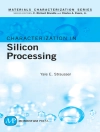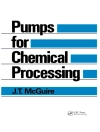Early and accurate fault detection and diagnosis for modern chemical plants can minimise downtime, increase the safety of plant operations, and reduce manufacturing costs. The process-monitoring techniques that have been most effective in practice are based on models constructed almost entirely from process data. The goal of the book is to present the theoretical background and practical techniques for data-driven process monitoring. Process-monitoring techniques presented include: Principal component analysis; Fisher discriminant analysis; Partial least squares; Canonical variate analysis.The text demonstrates the application of all of the data-driven process monitoring techniques to the Tennessee Eastman plant simulator – demonstrating the strengths and weaknesses of each approach in detail. This aids the reader in selecting the right method for his process application. Plant simulator and homework problems in which students apply the process-monitoring techniques to a nontrivial simulated process, and can compare their performance with that obtained in the case studies in the text are included. A number of additional homework problems encourage the reader to implement and obtain a deeper understanding of the techniques.The reader will obtain a background in data-driven techniques for fault detection and diagnosis, including the ability to implement the techniques and to know how to select the right technique for a particular application.
Richard D. Braatz & Leo H. Chiang
Data-driven Methods for Fault Detection and Diagnosis in Chemical Processes [PDF ebook]
Data-driven Methods for Fault Detection and Diagnosis in Chemical Processes [PDF ebook]
ซื้อ eBook เล่มนี้และรับฟรีอีก 1 เล่ม!
ภาษา อังกฤษ ● รูป PDF ● ISBN 9781447104094 ● สำนักพิมพ์ Springer London ● การตีพิมพ์ 2012 ● ที่สามารถดาวน์โหลดได้ 3 ครั้ง ● เงินตรา EUR ● ID 4678452 ● ป้องกันการคัดลอก Adobe DRM
ต้องใช้เครื่องอ่านหนังสืออิเล็กทรอนิกส์ที่มีความสามารถ DRM












